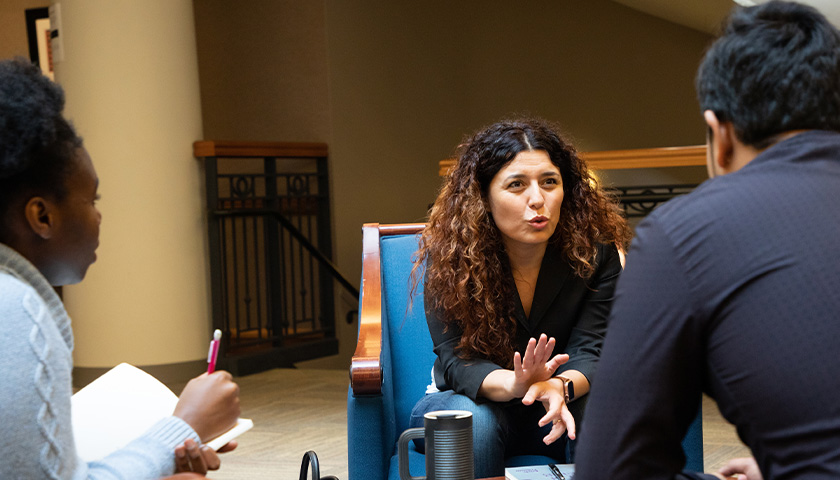Embracing Artificial Intelligence

"Whether our students are majoring in finance, marketing, entrepreneurship, or analytics, there's a place for them in the AI world," says Associate Dean of Undergraduate Programs Pelin Bicen.
Professor Pelin Bicen had a very busy start to the academic year. Over the course of two weeks, she made 20 presentations to more than 500 first-year Business School students about generative AI, the technology behind platforms like ChatGPT, Bard, and Microsoft’s Bing.
Rather than take a wait-and-see approach to AI, Bicen, in her role as associate dean of undergraduate programs, wants to get out in front and ensure that all Sawyer Business School students understand the potentials (and perils) of generative AI as they begin their academic careers. She sat down to outline how the Sawyer Business School is treating this transformative technology.
Q: Seems like AI has taken over the world in the past few months. True?
PB: It’s correct AI has quickly become an integral part of our everyday lives, from personalized recommendations on online platforms to advancements in healthcare, finance, and countless other fields. But it’s not just about robots or science fiction; it's about harnessing vast amounts of data to make informed decisions, automate repetitive tasks, and enhance human capabilities.
Q: How does AI fit into the Sawyer Business School curriculum?
PB: AI is not an isolated field. It intersects with business, economics, arts, humanities, and more. Our courses encourage interdisciplinary learning, allowing students to see the broader applications and implications of AI. Whether our students are majoring in finance, marketing, entrepreneurship, or analytics, there's a place for them in the AI world.
Q: What are some of the ways students can use AI?
PB: AI can be used for personalized learning. It can analyze a student's performance in real time, offering resources tailored to their specific needs or pacing the content to their learning speed. It can also be used as a virtual assistant. For example, ChatGPT can clarify doubts, offer explanations, or provide supplementary resources. This constant availability can bridge the gap between formal lectures and personal study time.
Q: Beyond how AI works and what it’s good for, what else are we teaching students about it?
PB: We believe in a holistic approach to AI education. Our curriculum is designed not only to impart technical skills but also to foster a deep understanding of the ethical, societal, and philosophical implications of AI. We want our students to be not just proficient in AI use, but also responsible AI practitioners who consider the broader impact of their work.
It's crucial that the next generation of AI practitioners understand the potential biases, inequalities, and societal impacts that can arise from AI systems. We aim to produce graduates who not only excel technically but also think critically about the technology they create and deploy.
Q: So, really, AI is simply one component of many business skills we teach.
PB: The field of AI is continually evolving. What's state-of-the-art today might be outdated tomorrow. We instill in our students the importance of lifelong learning. This ensures they remain adaptable and up-to-date with the latest advancements throughout their careers.
Q: If you’re the parent or guardian of a Sawyer Business School student, what do you want them to know?
PB: That SBS is committed to providing students with a comprehensive education—and that means preparing them to navigate the challenges and harness the opportunities of the AI-driven future.

Contact
Greg Gatlin
Office of Public Affairs
617-573-8428
Ben Hall
Office of Public Affairs
617-573-8092



